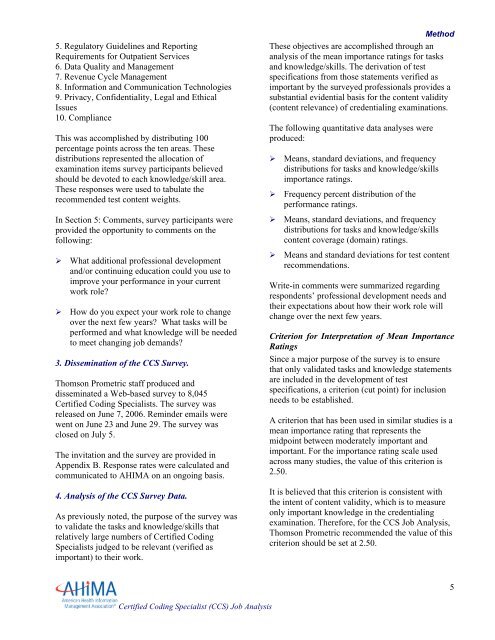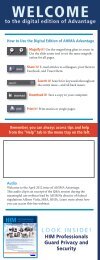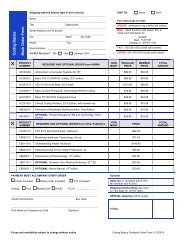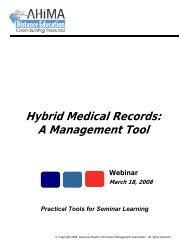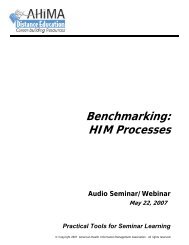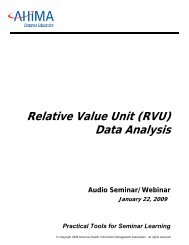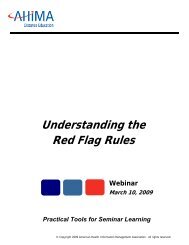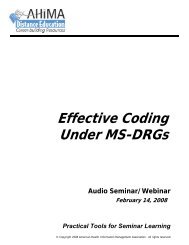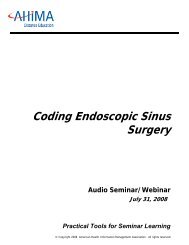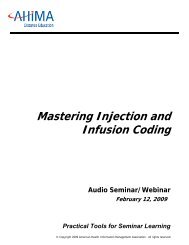Certified Coding Specialist (CCS) JOB ANALYSIS American Health ...
Certified Coding Specialist (CCS) JOB ANALYSIS American Health ...
Certified Coding Specialist (CCS) JOB ANALYSIS American Health ...
You also want an ePaper? Increase the reach of your titles
YUMPU automatically turns print PDFs into web optimized ePapers that Google loves.
5. Regulatory Guidelines and Reporting<br />
Requirements for Outpatient Services<br />
6. Data Quality and Management<br />
7. Revenue Cycle Management<br />
8. Information and Communication Technologies<br />
9. Privacy, Confidentiality, Legal and Ethical<br />
Issues<br />
10. Compliance<br />
This was accomplished by distributing 100<br />
percentage points across the ten areas. These<br />
distributions represented the allocation of<br />
examination items survey participants believed<br />
should be devoted to each knowledge/skill area.<br />
These responses were used to tabulate the<br />
recommended test content weights.<br />
In Section 5: Comments, survey participants were<br />
provided the opportunity to comments on the<br />
following:<br />
What additional professional development<br />
and/or continuing education could you use to<br />
improve your performance in your current<br />
work role?<br />
How do you expect your work role to change<br />
over the next few years? What tasks will be<br />
performed and what knowledge will be needed<br />
to meet changing job demands?<br />
3. Dissemination of the <strong>CCS</strong> Survey.<br />
Thomson Prometric staff produced and<br />
disseminated a Web-based survey to 8,045<br />
<strong>Certified</strong> <strong>Coding</strong> <strong>Specialist</strong>s. The survey was<br />
released on June 7, 2006. Reminder emails were<br />
went on June 23 and June 29. The survey was<br />
closed on July 5.<br />
The invitation and the survey are provided in<br />
Appendix B. Response rates were calculated and<br />
communicated to AHIMA on an ongoing basis.<br />
4. Analysis of the <strong>CCS</strong> Survey Data.<br />
As previously noted, the purpose of the survey was<br />
to validate the tasks and knowledge/skills that<br />
relatively large numbers of <strong>Certified</strong> <strong>Coding</strong><br />
<strong>Specialist</strong>s judged to be relevant (verified as<br />
important) to their work.<br />
<strong>Certified</strong> <strong>Coding</strong> <strong>Specialist</strong> (<strong>CCS</strong>) Job Analysis<br />
Method<br />
These objectives are accomplished through an<br />
analysis of the mean importance ratings for tasks<br />
and knowledge/skills. The derivation of test<br />
specifications from those statements verified as<br />
important by the surveyed professionals provides a<br />
substantial evidential basis for the content validity<br />
(content relevance) of credentialing examinations.<br />
The following quantitative data analyses were<br />
produced:<br />
Means, standard deviations, and frequency<br />
distributions for tasks and knowledge/skills<br />
importance ratings.<br />
Frequency percent distribution of the<br />
performance ratings.<br />
Means, standard deviations, and frequency<br />
distributions for tasks and knowledge/skills<br />
content coverage (domain) ratings.<br />
Means and standard deviations for test content<br />
recommendations.<br />
Write-in comments were summarized regarding<br />
respondents’ professional development needs and<br />
their expectations about how their work role will<br />
change over the next few years.<br />
Criterion for Interpretation of Mean Importance<br />
Ratings<br />
Since a major purpose of the survey is to ensure<br />
that only validated tasks and knowledge statements<br />
are included in the development of test<br />
specifications, a criterion (cut point) for inclusion<br />
needs to be established.<br />
A criterion that has been used in similar studies is a<br />
mean importance rating that represents the<br />
midpoint between moderately important and<br />
important. For the importance rating scale used<br />
across many studies, the value of this criterion is<br />
2.50.<br />
It is believed that this criterion is consistent with<br />
the intent of content validity, which is to measure<br />
only important knowledge in the credentialing<br />
examination. Therefore, for the <strong>CCS</strong> Job Analysis,<br />
Thomson Prometric recommended the value of this<br />
criterion should be set at 2.50.<br />
5


